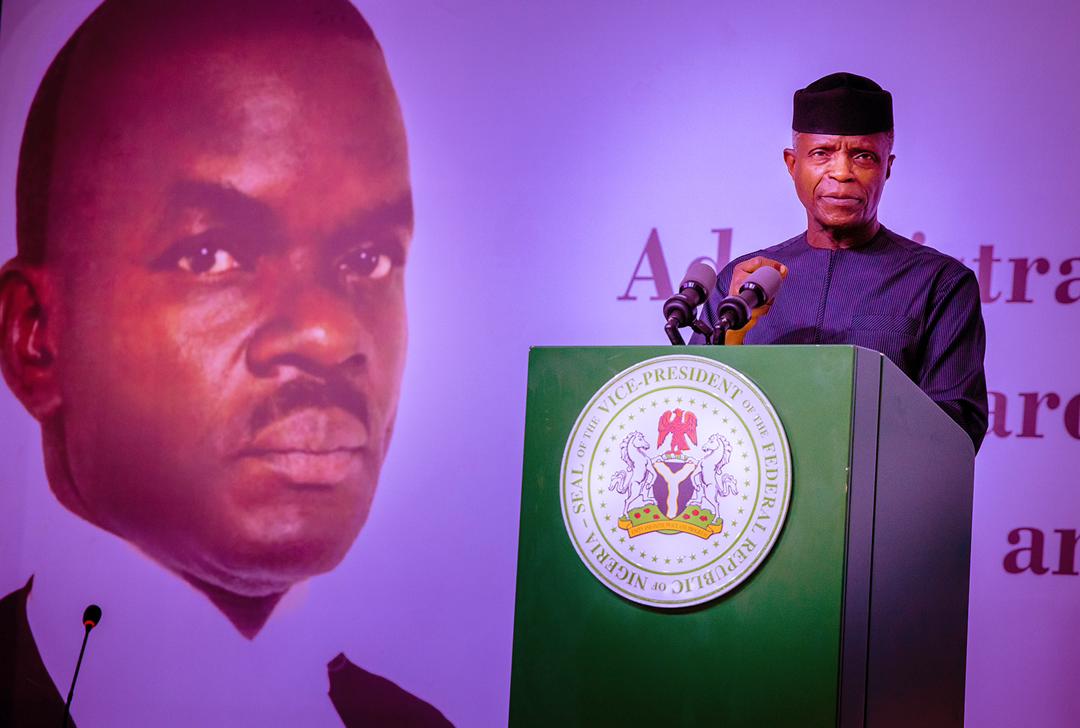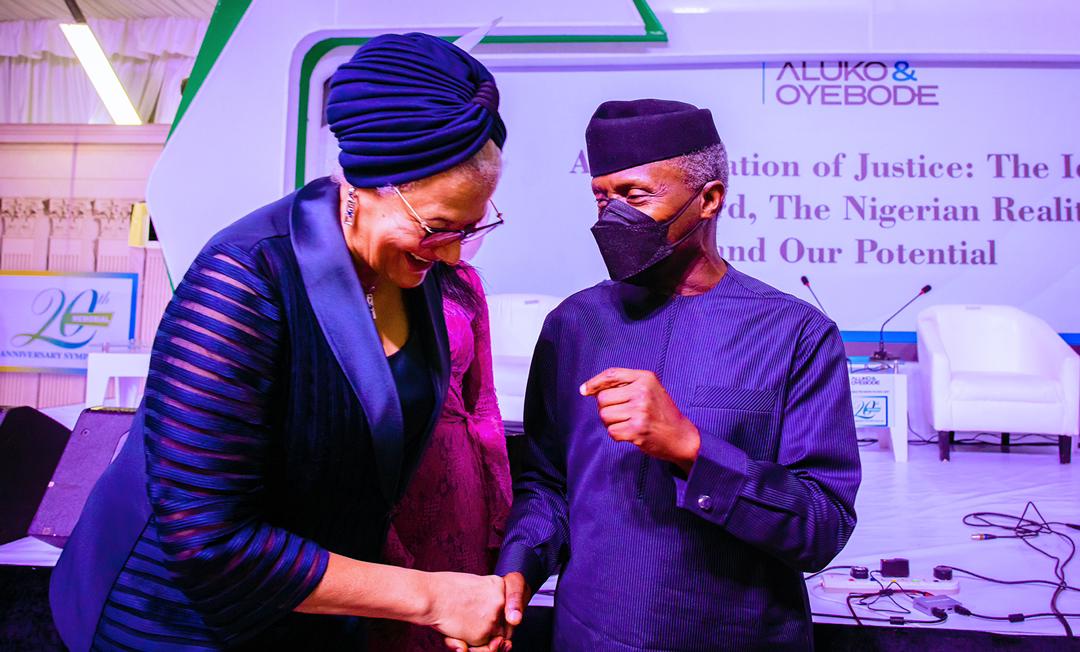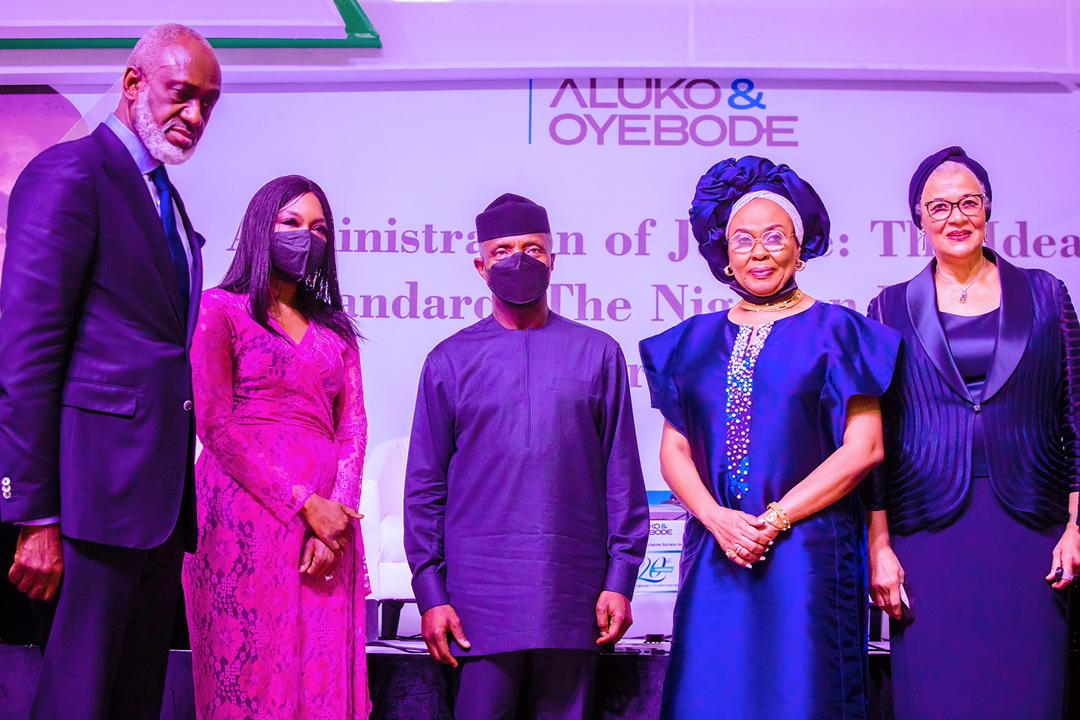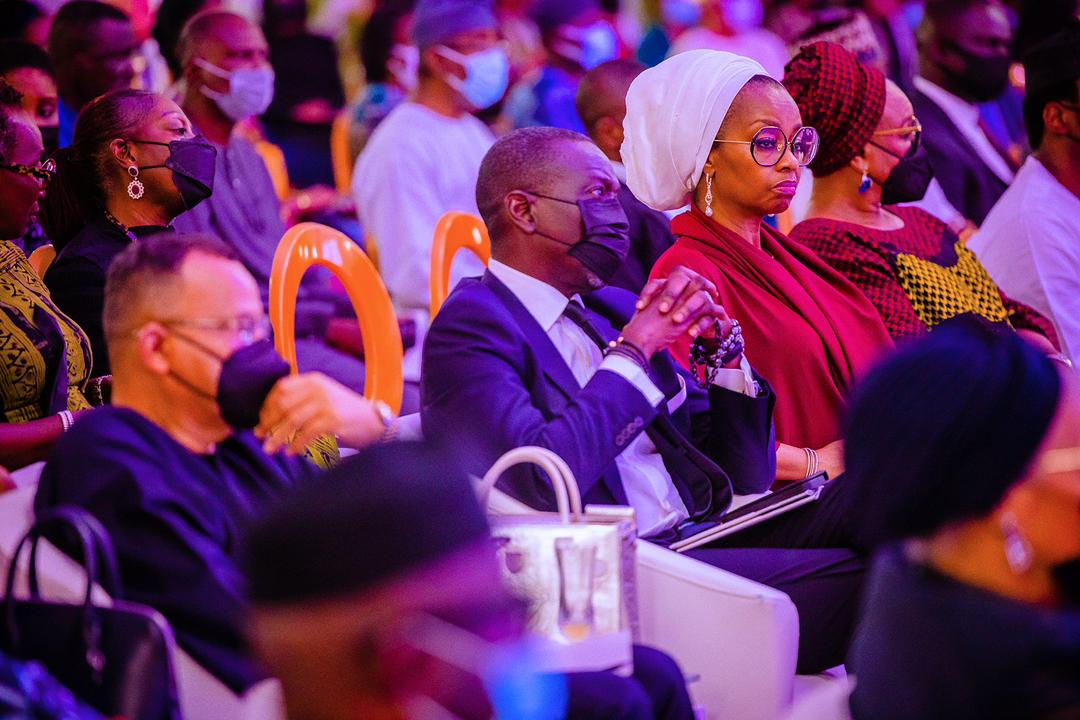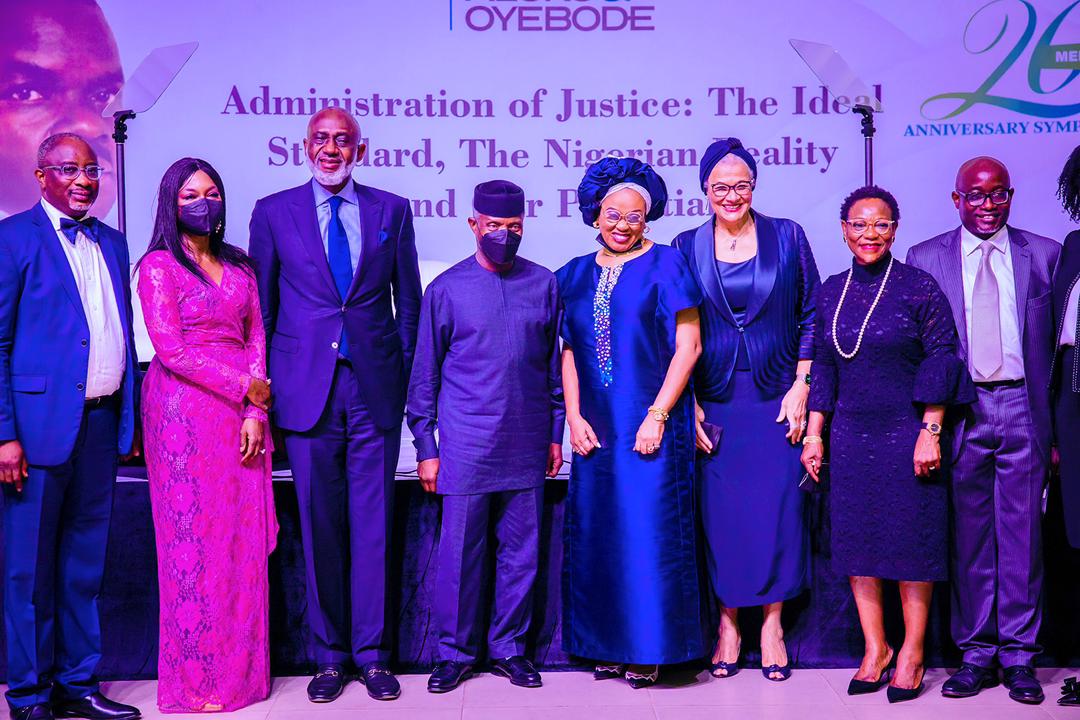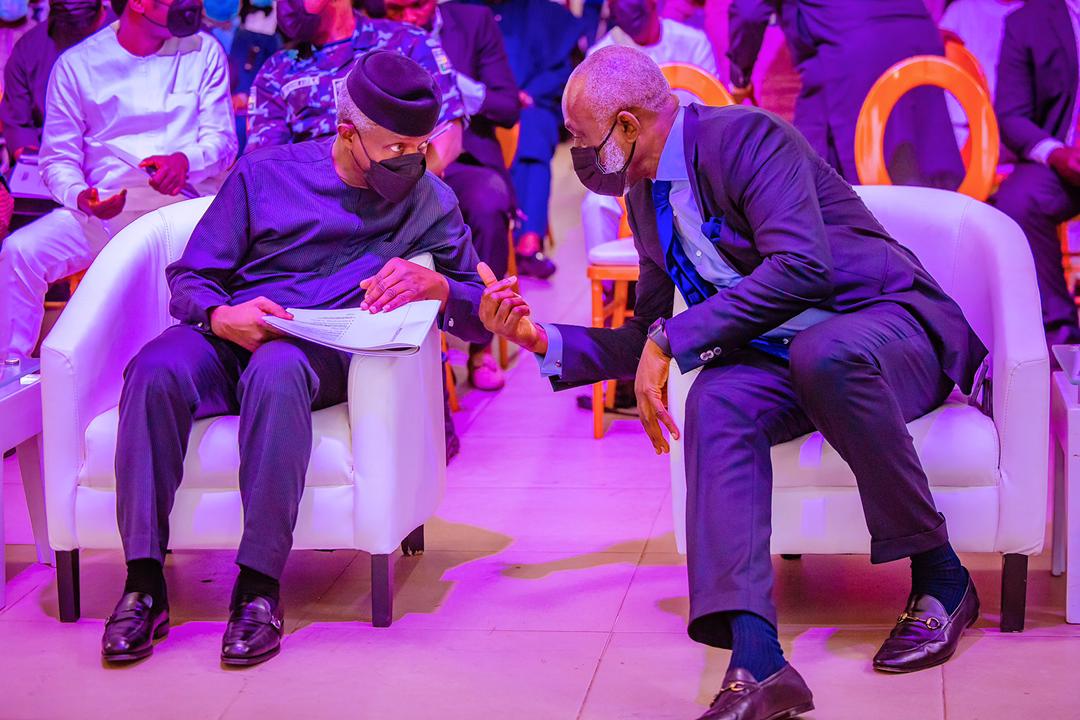20th Year Memorial Symposium In Honour Of Bankole Aluko, SAN
KEYNOTE LECTURE DELIVERED BY HIS EXCELLENCY, PROF. YEMI OSINBAJO, SAN, GCON, VICE PRESIDENT OF THE FEDERAL REPUBLIC OF NIGERIA AT THE 20TH YEAR MEMORIAL SYMPOSIUM IN HONOUR OF BANKOLE ALUKO, SAN, IN LAGOS ON THE 18TH OF FEBRUARY, 2022
“The democratic rights of the people and their confidence in the notion of a government of the people by the people for the people suffer when the system of electoral justice fails to see itself as a handmaid of the democratic process.”
PROTOCOLS
Every once in a long while a truly iconic figure comes by this way. Usually, one who excels on account of a unique talent. These are the sorts of people that are described as icons, but not often is it the case that the icon is multitalented and gifted in several varieties of ways. We had one (who passed away) 20 years ago, Bankole Aluko SAN.
Bankole lived outside my school, Igbobi College in the home of his parents, the legendary Prof. T.M Aluko, a distinguished Professor of Engineering and renowned author of the “One Man One Matchet” fame, and his wonderfully kind mum, was our French teacher at Igbobi in those days.
Bankole had that rare quality of the cross between an Igbobi boy and a King’s College boy. He played the bass guitar excellently in many bands; he played football competitively, he was a great debater, a dapper dresser, a great dancer and was incredibly driven.
He was a year ahead of me at the Faculty of Law UNILAG and I was intrigued by his capacity to enjoy himself so thoroughly and still excel in his academics. He chose to do a Masters at the London School of Economics, so did I. Kole would import his Star Lager beer from Nigeria, watch live football at Wimbledon, party at night and still sound better about his work than anyone else you knew.
Years later, he would be head of Chambers at the Chambers of Rotimi Williams and he was always my preferred lawyer for practically anything. He drafted pleadings with language that was so powerful, so poignant, so expressive that you were persuaded of his case before he argued it.
When he argued, he had the gift, a way with words, that was always deeply respectful of opponents. When as Adviser to the then Federal Attorney General, I was the extradition agent in the extradition of two notorious drug barons, it was Kole I engaged to represent me.
When as Attorney General of Lagos State and I was prosecuting the killers of Kudirat Abiola and others, and one of the accused persons libelled me as well as the judge in the case, it was Kole who I got to prosecute the contemnors, it was a landmark trial, the accused counsel eventually pleaded guilty and was disciplined by the court.
When I was sued for libel, he was my counsel, he filed my counterclaim, we won the case. Kole was quite simply brilliant. I have not, to date, met an advocate with his oratorical skills and his charisma.
When with Gbenga Oyebode, they founded Aluko and Oyebode, I knew the firm would be phenomenal. With Gbenga’s nose for the juiciest transactions and Kole’s mastery of the courtroom, I was right – Aluko and Oyebode took everybody’s lunch off the table and we are still recovering from that impact!
Kole once told me that his life ambition was to be a judge, and when I became Attorney General and we began the reform of the justice sector and appointment of judges, he was the first person I spoke to. But we both agreed because at that time, he was enjoying the fruits of his labour at Aluko and Oyebode and he needed to make a bit more money before accepting an appointment.
One of his favourite subjects was justice reform and we spent hours analyzing the issues which is why the topic of this lecture would have intrigued him – “Administration of Justice: The Ideal Standard, the Nigerian Reality and Our Potential.”
First, there is a need to clearly establish that the administration of the justice system is the foundation of law and order, commerce and democracy. When the system fails these pillars of governance and orderly society collapse. So, for example, the proliferation of criminal activity is directly related to the weakness of the administration of the criminal justice system.
In Nigeria, with a population in the order of 200million, we have between 15,000 – 20,000 convicts in jail. America with a population of about 300million, have about 3million in jail. The UK with a population of about 67 million has almost 80,000 convicts in jail. It is either we are remarkably well-behaved people here in Nigeria or there is something wrong with the criminal justice system.
As for commerce, we know that investor hesitancy is also a reflection of the inefficiencies and lack of confidence in the integrity of the commercial dispute resolution process.
Delays in commercial trials are particularly disastrous. The UK Court of Appeal had occasion to comment on delays in Nigerian courts in the case of IPCO v. NNPC [2015] EWCA Civ 1144 – where a challenge to the enforcement of a Nigerian seated arbitration tribunal award came before the English Court of Appeal.
The court referred to the delays in the parallel proceedings before a Nigerian Court as catastrophic and that it could take a further 30 years to resolve. Incidentally, the expert witness who testified on delays in the Nigerian Courts system was a former Justice of the Supreme Court who testified that a case could take 20 to 30 years to resolve in a Nigerian Court.
The court is a taxpayer-funded public resource, the wasting or abuse of its finite time and resources without strict consequence will eventually discredit the system, and we are seeing this on an incremental basis.
Addressing delays would therefore involve imposing sanctions by a more intentional regime for the award of adverse and wasted costs. Adverse costs are paid to the successful party in a civil case and wasted costs are directed against legal practitioners for poor professional standards in the conduct of a case. Severe costs should attend adjournments – there is no greater waste of taxpayer’s funds than for a scheduled case to have to be adjourned. It is only heavy costs that will discourage this type of malfeasance.
How about Democracy? The democratic rights of the people and their confidence in the notion of a government of the people by the people for the people suffer when the system of electoral justice fails to see itself as a handmaid of the democratic process.
In recent years, courts have substituted their judgments for the declared will of the electorate. The decision of the Supreme Court in the case of APC v. Marafa (SC.377/2019), where the Supreme Court nullified the elections of all candidates of the party, who were elected by the overwhelming majority of the electorate in Zamfara State in the 2019 elections on the grounds that the votes of the electorate were wasted since the APC’s primaries which produced the candidates were invalid. And, without recourse to the electorate, who had in the polls, rejected all the other candidates of the other political parties, the Supreme Court declared candidates of the parties rejected by the people as winners of the various offices – Governor, Senators, members of the House of Representatives, members of State House of Assembly.
For the voter, this decision must have been at best puzzling. First, they had no idea that the candidates were disqualified before voting. Indeed at least one court had declared the primaries valid and it was on that basis that INEC gave the go-ahead to the candidates to contest.
Second, rather than giving seats to those that the electorate had rejected, perhaps ordering a rerun would probably be more in consonance with the democratic imperative of sustaining the expressed will of the majority. Electoral cases are peculiar as it concerns democracy.
The whole point of the democratic process is that people choose their own leaders and this is a cyclical once-in-four-year process or sometimes longer. That process must be respected at all cost and judicial interpretation must take that into account, the fact that this is another pillar of our civilization.
But some of the failings of our system of administration of justice are themselves the consequence of philosophical, structural and institutional deficiencies. First the philosophical, to make sense judicial decisions and reasoning must in most cases meet the common notions of fairness and justice.
The system of justice must recognize the larger principles that it serves. In judicial interpretation, the spirit is as important as the letter of the law. Otherwise, judicial decisions become technistic applications far removed from the common notions of justice and equity.
So, for example, the notions of justice that would meet public expectations of fairness and equity are those that promote substance over form. Every decision of the court that promotes form over substance will always leave the people bewildered because people would be concerned about their expectations. They are not familiar with the “form” and procedural rules. The observance of technicality over merit would always alienate the system of justice from the people it is meant to serve.
For example, the Supreme Court held in Okafor v Nweke that signing processes in the name of a law firm instead of counsel, was enough to nullify proceedings at whatever stage the proceedings were! Since then, the court has nullified cases that took decades to get to the Supreme Court on account of this technicality. Why should an error by counsel over signatures rob a party of all merits of their case?
The frequency of jurisdictional challenges is a feature of this obsessive preoccupation with technicality.
And you know how we love catch-phrases and cliches: “jurisdiction is a threshold issue,” “it is the heart of the litigation” and like the case of UAC v Macfoy, you can’t put something on nothing (as Oditah pointed out that is not even necessarily correct.)
So, if a person steals money from you, he has no title to the money. But if the thief goes to a market and buys beef, he transfers the title to the vendor. Because title in currency passes upon delivery. The point is that just about any issue can be made a jurisdictional issue with devastating results.
In Zakari v Nigerian Army, Capt Zakari was the chairman of a task force assigned to investigate the illegal use of NITEL lines by yahoo boys for 419 activities. A court-martial eventually found him guilty of receiving a bribe of N40,000 from the suspects and releasing employees of the yahoo company that had been arrested.
He was court-martialled and convicted. He challenged his conviction on the basis that the court-martial panel had 4 members and that one of them was his junior. The relevant sections of the Armed Forces Act, Sections 129(b) and 133 of the Armed Forces Act required a court-martial panel to have three members all of whom should be senior to or at least the same rank as the accused officer.
In this case, 3 of the 4 officers were senior or the same rank as Zakari. The Supreme Court set aside the conviction, saying that once a member of the panel was disqualified notwithstanding that the officers constituting the quorum were qualified, the entire proceedings would be a nullity.
The question that the court in my view ought to have asked, is whether it was the intention of the lawmaker to nullify the proceedings of the tribunal when there was a quorum plus one or to ensure that a suspect is given a fair trial and in no event should an offender escape punishment. At the end of the day, in observing this technicality, the offender escaped justice.
Compare this to the Court of Appeal in England handling also a mandatory requirement of law. In the case of Regina v. Soneji and another (Respondents) (On Appeal from the Court of Appeal (Criminal Division) [2005] UKHL 49, Kamlesh Soneji and David Bullen pleaded guilty and were convicted in April 2000 of conspiracy to convert property and move the proceeds abroad knowing the same to represent the proceeds of criminal conduct. The property they tried to launder was confiscated but the law required that the confiscation orders must be made within 6 months of the conviction. Unfortunately, in this case, the confiscation order was made more than 18 months after conviction.
The convictions were upheld and the question before the court was whether this mandatory requirement that the confiscation order ought to have been made within 6 months could still hold especially when it was made within 18months and whether the confiscation order shouldn’t simply be discharged.
Lord Steyn said it was not useful to ask whether the rule prescribing a 6-month time limit was mandatory or directory. Instead, the true question to ask was whether Parliament intended that a failure to comply with the 6-month timetable should deprive the court of jurisdiction and invalidate all proceedings and orders made thereafter i.e., to focus on the consequence of non-compliance with the prescribed time limit.
He held that the intention of parliament was not that non-compliance deprived the court of jurisdiction. He also pointed out that it was in the public interest not to allow a convicted offender to escape confiscation simply because of errors in the judicial process.
How about the institutional and structural issues?
The institutional issues largely involve the quality of institutional capacity: judges, court registries, court staff and court infrastructure, including court buildings.
Aside from hard infrastructure, there are significant issues with capacity and efficiency in court registries. I will skip details on these issues so I can spend a bit of time on the appointment of judges.
With respect to the appointment of judges, it is quite frankly stunning that the process for evaluation and interview of judges, men and women statutorily empowered to literarily determine the lives and livelihoods of others is one of the least rigorous processes imaginable.
There are no clear evaluation processes for selecting judges, except in a few states. Lagos for example has a system for examining judges before they are appointed.
In the United Kingdom from where we derive most of the structures of our judicature, applicants to judicial offices in superior courts go through several screening processes, almost 17 different stages including written examinations, interviews and role-play exercises. They are subjected to background investigations covering professional credentials and abilities, public records, judicial pronouncements, and personal financial affairs; evaluation by the Bar Association on integrity, professional competence and judicial temperament.
And in the US, Supreme Court appointments involve rigorous public screening by the Senate, which sifts through the entire public, and sometimes private lives of candidates. Many of us have seen this on television.
The robustness and transparency of the processes in these jurisdictions provide comfort to the candidates of the fairness of the selection process and enable the public to have front-row seat in some of these processes.
Also, while we ask for the best from our judicial officers, we must equally ensure that the conditions under which they operate are not only befitting but are good enough to attract the best of minds in our profession. Judicial remuneration and welfare are critical. Why should a judge earn so much less than a federal legislator? We must strengthen the processes of reviewing performance, incentivising excellence, and penalising misconduct.
The judge is, of course, central to how our system of justice works. A lot of the things we complain about especially with delays have to do with the interaction of judges and counsel. It is the court, not counsel that must determine the pace of cases.
It is the court that exercises discipline in the courtroom, preventing and or punishing unethical behaviour. In doing so, the court disciplinary powers, especially of contempt must be simplified.
Today the technicality of contempt proceedings has robbed judges of their most potent disciplinary tool. To complement the judge in sanctioning unethical practices is the Nigerian Bar Association and its disciplinary jurisdiction. But this also needs to be rejigged. Complaints going before the NBA have caught the bug of judicial trial delays. The case management function of the judge is one that must be taught and re-taught.
Certainty or predictability of judicial outcomes is one of the major strengths of the common law. At the heart of this phenomenon is the doctrine of stare decisis – a doctrine that when a court has decided a matter, (judicial precedence,) that precedence will be followed by subsequent courts.
However unresolved conflicting decisions of our appellate courts threaten predictability and makes the job of offering legal opinions to clients difficult, if not outrightly precarious. It is important that the courts recognise the way that they influence not just the decisions of the court but the entire legal practice.
Enforcement of judicial decisions is a foundational issue. A system of justice is only as good as the effectiveness of its enforcement organs, so this is not an issue that we can afford to ignore and this rest squarely with the Executive.
Finally, is the use of technology. Digitization of court processes, records and services is the inevitable new frontier of justice delivery and will dramatically enhance access to justice and affect trial timelines. Already easy to use technology is available to be deployed at all stages of civil and criminal proceedings: commencement of criminal and civil proceedings, service of processes and hearing. Court registries are digitised so that court processes can be filed, stored and retrieved electronically with ease.
Parties can file all processes, and evidence online and participate in the proceedings virtually. Already, there has been a commendable response to the realities of functioning during a pandemic and the Supreme Court has endorsed virtual court proceedings. Technology has already permanently transformed the way we do business. It is destined to change the way our institutions work and that includes our courts.
Let me say that there is much hope for the positive reform of our system of administration of justice. More result-oriented work is going on. A few weeks ago, I attended a reform effort jointly undertaken by the National Judicial Council, the NBA, civil society and the Federal government. I think we can expect some real changes in the near future.
CONCLUSION
It was sometime in the afternoon of that fateful day that I heard Kole died. On my bedside, was a white envelope he sent to me two days earlier, and in it, he was talking about the follow-up to the contempt case I had mentioned earlier, and what we needed to do to ensure that the orders of the court were carried out. It was so confusing.
I remember his funeral, Asue Ighodalo standing at the head of the grave with his hands folded around his chest and the tears freely flowing and a few of us that remained to mourn in shock, and everyone just cried and cried. Years after we all remember him as though we spoke yesterday. There are some who Death somehow doesn’t manage to diminish.
We must all thank Gbenga, the partners and associates at Aluko and Oyebode for this 20th year memorial of our friend, your partner, and professional colleague. We all join Abiodun and the boys in celebrating their great dad today and we will always celebrate him.
May his memory and legacies always be blessed.
Thank you.


